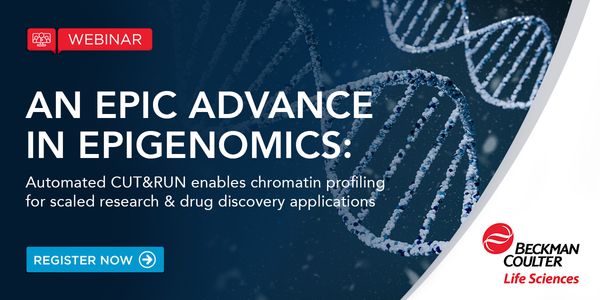Drug Metabolism
Drug metabolism is the term used to portray the biotransformation of drug substances in the body so they can be killed all the more without any problem. Most of metabolic cycles that include drugs happen in the liver, as the chemicals that encourage the responses are concentrated there.
-
Numerous biomedical applications have been described for liver-humanized mouse models, such as in drug metabolism or drug-drug interaction (DDI) studies. However, the strong enlargement of t...
MAR 27, 2024 | 8:00 AM
Metabolomics research involves two approaches: untargeted analysis, which provides a broad overview of molecular changes but lacks precision, and targeted analysis, which focuses on specific...
MAR 26, 2024 | 7:00 PM
C.E. CREDITS
The implementation of a preemptive pharmacogenomics (PGx) program in a hospital setting requires a multidisciplinary approach to ensure seamless integration of each stage of the process for...
Speaker:
Steven Melnick. Ph.D., M.D.
, Dr. David Mancuso, Pharm.D. CPh , MSPM
Sponsored By: Thermo Fisher Scientific
MAR 26, 2024 | 8:00 AM
C.E. CREDITS
The implementation of a preemptive pharmacogenomics (PGx) program in a hospital setting requires a multidisciplinary approach to ensure seamless integration of each stage of the process for...
Speaker:
Steven Melnick. Ph.D., M.D.
, Dr. David Mancuso, Pharm.D. CPh , MSPM
Sponsored By: Thermo Fisher Scientific
MAR 19, 2024 | 10:00 AM
C.E. CREDITS
Laboratories use the same laboratory equipment they invested in for COVID testing to perform PGx testing. With COVID testing reimbursement dropping, many laboratorians are considering implem...
NOV 01, 2023 | 8:00 AM
To bring your cutting-edge cell and gene therapies to the patients that need them as quickly as possible, you need access to the most knowledgeable scientists, innovative technologies, metho...
OCT 24, 2023 | 10:00 AM
Dynamic changes in chromatin drive gene expression programs during cellular development and contribute to pathological changes underlying disease. To date, efforts to characterize chromatin...
SEP 19, 2023 | 8:00 AM
In vitro ADME and drug-drug interaction (DDI) investigations are early activities in the drug development process that are critical for framing downstream decision making. Understanding the...
JUN 29, 2023 | 8:00 AM
Molecular biology workflows within drug discovery and development pipelines rely on the efficient extraction and cleanup of nucleic acids. Maximizing recovery, consistency and speed is achie...
Non-alcoholic fatty liver disease (NAFLD) is a spectrum of metabolic disorders affecting 25% of our global population. 20% of NAFLD patients go on to develop Non-alcoholic steatohepatitis (N...
FEB 21, 2023 | 10:00 AM
Date: February 21, 2023 Time: 10:00am (PST), 1:00pm (EST), 7:00pm (CET) The use of algorithms that alter patient medical care based on race has fallen under increasing criticism, as race-bas...
JAN 17, 2023 | 9:00 AM
Date: January 17, 2023 Time: 9:00am (PST), 12:00pm (EST), 6:00pm (CET) As SARS-CoV-2 infections continue to ebb and flow, other respiratory viruses have made a big comeback on the world stag...
NOV 29, 2022 | 6:00 AM
Date: November 29, 2022 Time: 6:00am (PST), 9:00pm (EST), 3:00pm (CET) Antimicrobial resistance is an emerging problem in healthcare, and represents one of the most crucial challenges for th...
OCT 19, 2022 | 10:00 AM
Date: October 19, 2022 Time: 10:00am (PDT), 1:00pm (EDT), 7:00pm (CEST) In this webinar, we will introduce the generation and applications of Biocytogen’s severely immunodeficient (B-N...
SEP 29, 2022 | 11:00 AM
Date: September 29, 2022 Time: 11:00am (PDT), 2:00pm (EDT), 8:00pm (CEST) Pharmacogenomic (PGx) testing is a dynamic and fascinating application for genetic testing. We'll review the bas...
AUG 09, 2022 | 8:00 AM
Date: August 09, 2022 Time: 8:00am (PDT), 11:00pm (EDT), 5:00pm (CEST) Regulatory T cells (Tregs) are an important T cell subpopulation that maintains immunological homeostasis. Today, Treg-...
MAY 31, 2022 | 6:00 AM
Date: May 31, 2022 Time: 6:00am (PDT), 9:00am (EDT), 3:00pm (CEST) This webinar will introduce why deep structural elucidation of drug candidate metabolism is a requisite part of early- to l...
The CYP2D6 enzyme metabolizes approximately 25% of commonly used pharmaceuticals and is of intense pharmacogenetic interest. Polymorphisms in CYP2D6 can alter an individual’s response...
The quest for alternatives to animal safety testing has fueled the development, characterization, and validation of many new technologies. There have been advances in cell and tissue models...
The explosion of biomedical data such as in genomics, structure biology and pharmacology can provide new opportunities to improve our understanding of human physiology and disease. Understan...
Speaker:
Alexander Sebastian Hauser, PhD
Presented at: Drug Discovery & Development Virtual Event Series 2022
DEC 09, 2021 | 6:00 AM
Date: December 9, 2021 Time: 6:00am (PDT), 9:00 am (EDT) As the number of biotherapeutic candidates in development is increasing, the requirements of analytical tools to understand the molec...
DEC 01, 2021 | 7:00 AM
Date: December 01, 2021 Time: 7:00am (PST), 10:00am (EST) In the era of immuno-oncology, there is a growing need for the identification of new biomarkers predictive for sensitivity to anti-P...
NOV 16, 2021 | 9:00 AM
Date: November 16, 2021 Time: 9:00am (PDT), 12:00pm (EDT) Discovery in biological research was historically driven by empirical methods. The advent of biological engineering, propelled by te...
OCT 12, 2021 | 6:00 AM
Date: October 12, 2021 Time: 6:00am (PDT), 9:00am (EDT), 3:00pm (CEST) Dr. Diana Kalinina shall introduce the MALDI Biotyper ® sirius platform and elaborate the already available as well...
Speaker:
Diana Kalinina, PhD
, Gerald Larrouy-Maumus, PhD
Sponsored By: Bruker Microbiology & Infection Diagnostics
Numerous biomedical applications have been described for liver-humanized mouse models, such as in drug metabolism or drug-drug interaction (DDI) studies. However, the strong enlargement of t...
MAR 27, 2024 | 8:00 AM
Metabolomics research involves two approaches: untargeted analysis, which provides a broad overview of molecular changes but lacks precision, and targeted analysis, which focuses on specific...
MAR 26, 2024 | 7:00 PM
C.E. CREDITS
The implementation of a preemptive pharmacogenomics (PGx) program in a hospital setting requires a multidisciplinary approach to ensure seamless integration of each stage of the process for...
Speaker:
Steven Melnick. Ph.D., M.D.
, Dr. David Mancuso, Pharm.D. CPh , MSPM
Sponsored By: Thermo Fisher Scientific
MAR 26, 2024 | 8:00 AM
C.E. CREDITS
The implementation of a preemptive pharmacogenomics (PGx) program in a hospital setting requires a multidisciplinary approach to ensure seamless integration of each stage of the process for...
Speaker:
Steven Melnick. Ph.D., M.D.
, Dr. David Mancuso, Pharm.D. CPh , MSPM
Sponsored By: Thermo Fisher Scientific
MAR 19, 2024 | 10:00 AM
C.E. CREDITS
Laboratories use the same laboratory equipment they invested in for COVID testing to perform PGx testing. With COVID testing reimbursement dropping, many laboratorians are considering implem...
NOV 01, 2023 | 8:00 AM
To bring your cutting-edge cell and gene therapies to the patients that need them as quickly as possible, you need access to the most knowledgeable scientists, innovative technologies, metho...
OCT 24, 2023 | 10:00 AM
Dynamic changes in chromatin drive gene expression programs during cellular development and contribute to pathological changes underlying disease. To date, efforts to characterize chromatin...
SEP 19, 2023 | 8:00 AM
In vitro ADME and drug-drug interaction (DDI) investigations are early activities in the drug development process that are critical for framing downstream decision making. Understanding the...
JUN 29, 2023 | 8:00 AM
Molecular biology workflows within drug discovery and development pipelines rely on the efficient extraction and cleanup of nucleic acids. Maximizing recovery, consistency and speed is achie...
Non-alcoholic fatty liver disease (NAFLD) is a spectrum of metabolic disorders affecting 25% of our global population. 20% of NAFLD patients go on to develop Non-alcoholic steatohepatitis (N...
FEB 21, 2023 | 10:00 AM
Date: February 21, 2023 Time: 10:00am (PST), 1:00pm (EST), 7:00pm (CET) The use of algorithms that alter patient medical care based on race has fallen under increasing criticism, as race-bas...
JAN 17, 2023 | 9:00 AM
Date: January 17, 2023 Time: 9:00am (PST), 12:00pm (EST), 6:00pm (CET) As SARS-CoV-2 infections continue to ebb and flow, other respiratory viruses have made a big comeback on the world stag...
NOV 29, 2022 | 6:00 AM
Date: November 29, 2022 Time: 6:00am (PST), 9:00pm (EST), 3:00pm (CET) Antimicrobial resistance is an emerging problem in healthcare, and represents one of the most crucial challenges for th...
OCT 19, 2022 | 10:00 AM
Date: October 19, 2022 Time: 10:00am (PDT), 1:00pm (EDT), 7:00pm (CEST) In this webinar, we will introduce the generation and applications of Biocytogen’s severely immunodeficient (B-N...
SEP 29, 2022 | 11:00 AM
Date: September 29, 2022 Time: 11:00am (PDT), 2:00pm (EDT), 8:00pm (CEST) Pharmacogenomic (PGx) testing is a dynamic and fascinating application for genetic testing. We'll review the bas...
AUG 09, 2022 | 8:00 AM
Date: August 09, 2022 Time: 8:00am (PDT), 11:00pm (EDT), 5:00pm (CEST) Regulatory T cells (Tregs) are an important T cell subpopulation that maintains immunological homeostasis. Today, Treg-...
MAY 31, 2022 | 6:00 AM
Date: May 31, 2022 Time: 6:00am (PDT), 9:00am (EDT), 3:00pm (CEST) This webinar will introduce why deep structural elucidation of drug candidate metabolism is a requisite part of early- to l...
The CYP2D6 enzyme metabolizes approximately 25% of commonly used pharmaceuticals and is of intense pharmacogenetic interest. Polymorphisms in CYP2D6 can alter an individual’s response...
The quest for alternatives to animal safety testing has fueled the development, characterization, and validation of many new technologies. There have been advances in cell and tissue models...
The explosion of biomedical data such as in genomics, structure biology and pharmacology can provide new opportunities to improve our understanding of human physiology and disease. Understan...
Speaker:
Alexander Sebastian Hauser, PhD
Presented at: Drug Discovery & Development Virtual Event Series 2022























